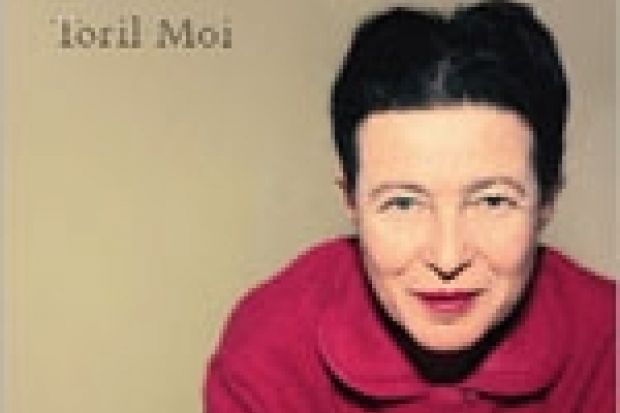In 2008, the centenary year of Simone de Beauvoir's birth, the publication of the second edition of Toril Moi's trailblazing 1994 study is a timely reminder of the achievements and complexities of Beauvoir's trajectory as feminist philosopher, writer and memorialist. The first edition of Moi's work provided crucial impetus to the renaissance in de Beauvoir studies, which began in the mid-1990s, offering a new wave of readings of France's foremost feminist thinker and author of the Le deuxieme sexe, described here as the "emblematic intellectual woman of the twentieth century".
For de Beauvoir's work has finally been wrested from the patriarchal intellectual history that saw her as a dutiful Sartrean disciple as well as from second-wave differentialist feminism's relegation of its foremother to the role of "first wave" equality feminist, rooted in Enlightenment humanism, who clung to the life-raft of an autonomous rational subject at a time when sexual difference, writ large upon the body, constituted the Zeitgeist of French feminist thinking.
As Moi argues here, reception of de Beauvoir's intellectual project and life choices has been marked by dismissal, misreading and moralising as well as by hagiography, pointing to a variety of vested interests at play that have until recently prevented a clear-sighted engagement with her work. Moreover, recognition of her philosophical originality could not have been registered by those Anglophone readers who read Le deuxieme sexe in English because the 1953 translation of de Beauvoir's text by zoologist H.M. Parshley is marred by errors in philosophical translation, unacknowledged omissions (about 15 per cent is excised from the original French) and frequent rewritings. This sorry state of affairs will hopefully be remedied by a new translation to be published in 2009.
Recent work by feminist philosophers has foregrounded the importance of de Beauvoir's phenomenological approach to gender in Le deuxieme sexe, combined with her original syntheses of existentialism, Hegelianism, Marxism and anthropology. Amid this new work, Moi's "neo-biographical" study does de Beauvoir the great service of reading several of her key works and life en situation - in other words, as an emergent synthesis of both the freedom to choose and the facticity of "given" aspects of the life.
In the early chapters, deploying Pierre Bourdieu's concepts of "habitus" and "cultural capital", Moi examines the remarkable nature of de Beauvoir's intellectual achievements. Born during the belle epoque, she belonged to a generation of French women who were able to pursue their studies to baccalaureate level and beyond, although unlike many of her male peers including Sartre, she was effectively barred from studying philosophy at the Ecole Normale Superieure in Paris. Referring briefly in the updated introduction to de Beauvoir's newly published 1926- diaries, written several years before she met Sartre, Moi convincingly argues that they reveal an intensely intellectual and passionate sensibility at work whose thoughts were already turning to questions such as "the problem of other minds", authenticity and self-delusion, gender identity as a "becoming" and the subject's ambiguous relationship to embodiment - all of which were to be later thought through in fictional texts such as L'Invitee (1943) and philosophical texts such as Pour une morale de l'ambiguite (1947) and Le deuxieme sexe (1949).
In two key chapters Moi engages with Le deuxieme sexe in which de Beauvoir theorises how women become "subjected" by patriarchal ideology, alienated in masculinist myth and projection and from their own potential as emergent subjects. That de Beauvoir was herself not immune from having to negotiate her own professional and personal marginalisation, argues Moi, is especially apparent in her posthumously published diaries and letters, penned to stave off an ever-looming "nothingness" amid the existential rapture of a very rich life. Among these, the love letters to American writer Nelson Algren (written in part while de Beauvoir was writing Le deuxieme sexe) have been a source of particular fascination for some who cite them as if to demean her intellectual achievement, erroneously believing that feminists do not fall in love or need a sense of humour. Moi's brilliant analysis of her subject is de Beauvoir criticism at its very best, demonstrating that the richly stimulating text of Simone de Beauvoir deserves to be widely and well read.
Simone de Beauvoir: The Making of an Intellectual Woman
By Toril Moi
Oxford University Press
400pp
£30.00
ISBN 9780199238712
Published 10 January 2008
Register to continue
Why register?
- Registration is free and only takes a moment
- Once registered, you can read 3 articles a month
- Sign up for our newsletter
Subscribe
Or subscribe for unlimited access to:
- Unlimited access to news, views, insights & reviews
- Digital editions
- Digital access to THE’s university and college rankings analysis
Already registered or a current subscriber? Login




